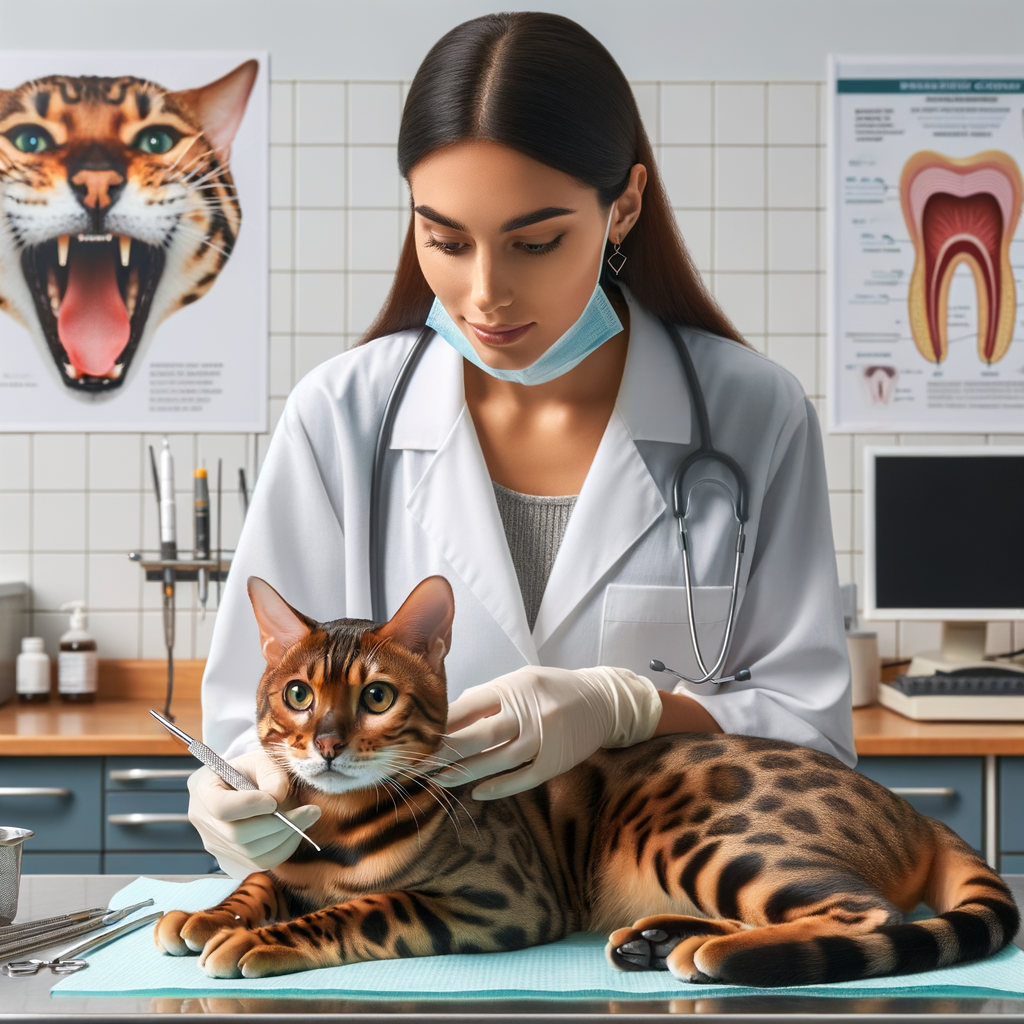
The Importance of Bengal Cat Dental Health
Bengal cats, like all cats, need good dental care. Their teeth can get plaque and tartar, which can lead to problems. Regular check-ups and cleanings are important.
- The role of dental health in overall cat health:
Dental health is key to a Bengal cat’s overall well-being. Poor dental health can cause pain and infections. It can even affect their heart and kidneys.
- Common dental issues in Bengal cats:
Bengal cats can suffer from several dental issues. These include gingivitis, periodontal disease, and tooth resorption. Early detection and treatment are crucial.
The Benefits of Regular Dental Care for Bengal Cats
- Preventing dental disease in Bengal cats:
Regular dental care helps prevent common dental issues like gingivitis and periodontal disease. These conditions can cause pain and discomfort for your Bengal cat. By maintaining their dental health, you can keep their teeth and gums healthy and strong.
- Improving the quality of life:
Healthy teeth and gums contribute to your Bengal cat’s overall well-being. Cats with good dental health are more likely to eat well, play actively, and enjoy their daily lives. Regular dental check-ups and cleanings can help ensure your cat stays happy and healthy.
- Reducing long-term health costs:
Investing in regular dental care can save you money in the long run. Dental diseases can lead to more serious health issues that require expensive treatments. By preventing these problems early on, you can avoid costly veterinary bills and keep your Bengal cat healthy.
Dental Care Tips for Bengal Cats
Bengal Cat Oral Care Routine
- Regular Bengal cat teeth cleaning:
It’s important to clean your Bengal cat’s teeth regularly. Aim for at least once a week. Use a soft-bristled toothbrush and special cat toothpaste. This helps remove plaque and prevent tartar buildup.
- Using cat-friendly dental products:
Always use products made specifically for cats. Human toothpaste can be harmful to them. Look for cat-friendly toothpaste and dental chews. These products help keep your Bengal cat’s mouth healthy.
- Regular check-ups with the vet:
Schedule regular vet visits for your Bengal cat. The vet can check for dental issues and clean your cat’s teeth professionally. This helps catch problems early and keeps your cat’s mouth in top shape.
Best Dental Practices for Bengal Cats
- Introducing dental care early:
It’s important to start dental care when your Bengal cat is young. This helps them get used to the process. Begin by gently touching their mouth and teeth. Gradually introduce a cat-friendly toothbrush and toothpaste. Early dental care can prevent many problems later on.
- Maintaining a consistent dental care routine:
Regular brushing is key. Aim to brush your Bengal cat’s teeth at least a few times a week. Use products designed for cats. Consistency helps keep their teeth and gums healthy. It also reduces the risk of dental diseases.
- Monitoring for signs of dental disease:
Watch for signs like bad breath, red or swollen gums, and difficulty eating. These can be signs of dental problems. Regular vet check-ups are essential. Your vet can spot issues early and provide treatment if needed.
Preventing Dental Issues in Bengal Cats
Diet and Bengal Cat Dental Health
Maintaining good dental health in Bengal cats is crucial. One of the key factors is their diet. Let’s explore how diet plays a role in keeping their teeth healthy and what foods are recommended.
- The role of diet in maintaining Bengal cat dental health:
A balanced diet is essential for Bengal cats. It helps in reducing plaque and tartar buildup. Dry food, for instance, can act like a toothbrush, scraping off some of the plaque as your cat chews. Wet food, on the other hand, provides hydration but may not be as effective in cleaning teeth. Therefore, a mix of both can be beneficial.
- Recommended foods for dental health:
Choosing the right food can make a big difference. Here are some recommendations:
-
- Dry kibble: Helps in reducing plaque. Look for brands that are specifically designed for dental health.
- Raw bones: Can help in cleaning teeth naturally. Always supervise your cat while they chew on bones to avoid choking hazards.
- Dental treats: Specially formulated treats can aid in maintaining dental hygiene. These treats often contain ingredients that help in breaking down plaque.
| Food Type | Benefits |
|---|---|
| Dry Kibble | Reduces plaque buildup |
| Raw Bones | Natural teeth cleaning |
| Dental Treats | Breaks down plaque |
Regular Vet Check-ups
- The importance of regular vet visits
Regular vet visits are crucial for your Bengal cat’s dental health. Just like humans, cats need their teeth checked to prevent problems. Vets can spot issues early, which helps avoid pain and costly treatments later.
According to the American Veterinary Dental Society, 70% of cats show signs of dental disease by age three. Regular check-ups can help catch these issues early.
- What to expect during a dental check-up
During a dental check-up, the vet will examine your cat’s mouth, teeth, and gums. They look for signs of plaque, tartar, and gum disease. The vet may also take X-rays to see the health of the teeth below the gum line.
Sometimes, the vet will clean your cat’s teeth to remove plaque and tartar. This process helps keep your cat’s mouth healthy and prevents future problems.
Case Study: Improving Bengal Cat Dental Health
- Background of the Case Study
Meet Bella, a 4-year-old Bengal cat. Bella’s owner noticed she had bad breath and was reluctant to eat. A visit to the vet revealed that Bella had dental issues, including plaque buildup and gum inflammation.
- Steps Taken to Improve Dental Health
The vet recommended a comprehensive dental care plan for Bella. Here are the steps taken:
-
- Professional dental cleaning to remove plaque and tartar.
- Daily brushing with a cat-friendly toothpaste.
- Switching to a dental diet designed to reduce plaque.
- Providing dental treats that help clean teeth.
- Regular check-ups every six months to monitor dental health.
- Results and Key Takeaways
After six months, Bella showed significant improvement. Her breath was fresher, and she was eating normally again. The key takeaways from Bella’s case are:
- Regular dental care can prevent serious dental issues.
- Daily brushing is crucial for maintaining dental health.
- Special diets and treats can aid in reducing plaque.
- Frequent vet visits help catch problems early.
This case study highlights the importance of proactive dental care for Bengal cats to ensure their overall health and well-being.
Conclusion: Maintaining Bengal Cat Dental Health
Dental health is crucial for Bengal cats. It helps prevent painful issues like tooth decay and gum disease. Regular dental care can also improve their overall well-being and longevity.
- Final tips for maintaining Bengal cat dental health:
-
- Brush your Bengal cat’s teeth regularly using cat-friendly toothpaste.
- Provide dental treats and toys to help keep their teeth clean.
- Schedule regular vet check-ups to monitor their dental health.
- Watch for signs of dental problems, such as bad breath or difficulty eating.
By following these tips, you can help ensure your Bengal cat has a healthy mouth and a happy life. Remember, good dental care is a key part of your cat’s overall health.
| Tip | Benefit |
|---|---|
| Regular Brushing | Prevents plaque buildup |
| Dental Treats | Helps clean teeth naturally |
| Vet Check-ups | Early detection of dental issues |
| Monitor Signs | Quick response to problems |






